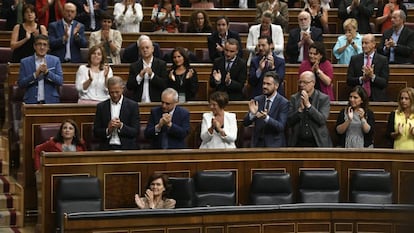Spanish Congress approves exhumation of Franco’s remains
Government decree ordering removal of dictator’s body was greenlighted with 176 yes votes out of 350

Spanish Congress on Thursday greenlighted a government plan to exhume the remains of dictator Francisco Franco from the Valley of the Fallen monument. A decree put to the vote by the Socialist (PSOE) government of Pedro Sánchez passed with 172 votes in favor, two against, and 164 abstentions.
The initiative, which was first approved by the Cabinet in late August, was one of the first government measures announced by Sánchez when he came to power in early June after winning a vote of no confidence against former prime minister Mariano Rajoy. With just 84 lawmakers in the 350-seat house, Sánchez is far short of a majority and needs the support of other parties to pass legislation.
Franco is the the only one among the more than 33,000 people whose bodies lie in the Valley of the Fallen who was not a victim of the Civil War
The PP and center-right group Ciudadanos had already stated that they would abstain at today’s vote to approve or reject the decree. The two no votes were cast by PP deputies Jesús Posada and José Ignacio Llorens, who later said they had meant to abstain.
The decree introduces a change to the 2007 Historical Memory Law, which was passed by a previous PSOE administration in a bid to address some of the wounds left behind by the Spanish Civil War (1936-1939) and the subsequent Franco dictatorship.
A new article added to the law reads: “Only the mortal remains of those who died as a consequence of the Spanish Civil War may rest in the Valley of the Fallen, as a place of commemoration, memory and tribute to the victims of the conflict.”
In a post on Twitter, Prime Minister Sánchez wrote after the vote: “Justice. Memory. Dignity. Today #Spain has taken a historic step to redress the rights of the victims of Francoism. Today our #democracy is better.”

Also writing on Twitter, Podemos deputy Íñigo Errejón said: “Today we take Franco out of the Valley of the Fallen mausoleum because a dictator cannot rest together with his victims. Our country is settling some of its debts with democracy, with justice and with the redress due to the victims of the dictatorship.”
When the result of the vote was announced, applause broke out among half of the lawmakers, as well as among observers in the public gallery. Sitting among them was Irish hispanist Ian Gibson. “Today is the happiest day of my life,” he told EL PAÍS. “I’ve been waiting for this for 40 years. Spain has been freed, and is on its way to democratic normalcy.”
Family opposed
The seven grandchildren of Francisco Franco have filed a petition with the Ombudsman’s Office, requesting the latter to mount a legal challenge in the Constitutional Court against the government decree to exhume the dictator’s remains from the Valley of the Fallen. The Franco family says that the exhumation “goes against the will of his descendants.”
Franco’s relatives also reject the method used for this initiative, a “decreto-ley,” a fast-track formula that avoids the lengthier process that regular bills undergo. These decrees emanate from the executive, although they require congressional approval within a short deadline. Franco’s family has warned the Pedro Sánchez administration that if it presses ahead with the initiative, it could be incurring in several crimes, including the “desecration of graves.”
A memorial
Franco is the only one among the more than 33,000 people whose bodies lie in the Valley of the Fallen who was not a victim of the Civil War. For the last 43 years he has lain in state at a site that attracts thousands of visitors each year. The controversial mausoleum, built between 1941 and 1959 by around 20,000 men – many of them political prisoners – has routinely been the subject of public debate as to its future.
The government wants to transfer Franco’s body before the end of the year and turn the Valley of the Fallen into a memorial site. The mayor of Águeda, a village in Salamanca province that was founded by the dictator in 1954, has offered to take the dictator’s remains.
English version by Simon Hunter and Susana Urra.
Tu suscripción se está usando en otro dispositivo
¿Quieres añadir otro usuario a tu suscripción?
Si continúas leyendo en este dispositivo, no se podrá leer en el otro.
FlechaTu suscripción se está usando en otro dispositivo y solo puedes acceder a EL PAÍS desde un dispositivo a la vez.
Si quieres compartir tu cuenta, cambia tu suscripción a la modalidad Premium, así podrás añadir otro usuario. Cada uno accederá con su propia cuenta de email, lo que os permitirá personalizar vuestra experiencia en EL PAÍS.
¿Tienes una suscripción de empresa? Accede aquí para contratar más cuentas.
En el caso de no saber quién está usando tu cuenta, te recomendamos cambiar tu contraseña aquí.
Si decides continuar compartiendo tu cuenta, este mensaje se mostrará en tu dispositivo y en el de la otra persona que está usando tu cuenta de forma indefinida, afectando a tu experiencia de lectura. Puedes consultar aquí los términos y condiciones de la suscripción digital.








































